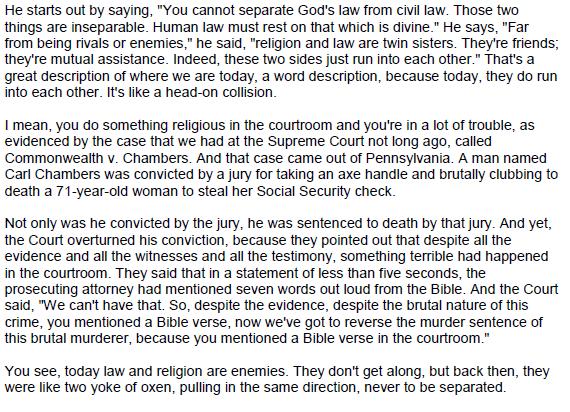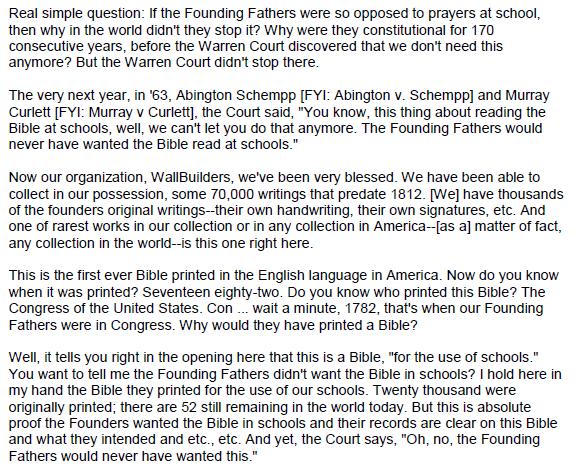This probably should have been in the weekend roundup.
The History of Parson Weems – A new genre of history/writing suggests itself for Mr. Barton’s works – Weemsian History.
Category: david barton
Weekend Roundup – Tanks, Government Lies, Anti-Gay Pride, Christian Persecution, Government Shut Down
These are some items of interest that I either didn’t get to or need no additional noise from me.
David Barton: Tanks A Lot – David Barton told his Wallbuilders audience that private citizens should be allowed to have whatever weapons the government has – tanks, fighter jets, whatever. Just like the founders had.
How Do You Know When The Government Is Lying? – That’s the burning question Michael Peroutka asks on his IOTC website. He claims that the government and the media conspire together ” to endanger you, impoverish you or otherwise to harm you.” I also learned that the media hyped up the dangers of Swine Flu in 2009 to “provide cover” for the government to meddle in health care.
Scott Lively and Bryan Fischer Celebrate Anti-Gay Pride – At 10:25, Lively calls his indirect influence on Russia’s anti-gay law “one of the proudest achievements of my career.” Guess it is all downhill from there.
Christians are under attack all over the world and the Church seems silent – Kirsten Powers’ thought provoking editorial provoked me. I will return to this issue next week. My initial view is that most Christians in the pew are praying but don’t know what else to do. Our evangelical leaders are consumed with Values Voting and Culture Warring and Taking The Country Back.
Oh, and the government might shut down…
Does Ted Cruz Believe The First Amendment Is Only For Monotheists?
Reading Senator Ted Cruz’s endorsement of David Barton in Monday’s edition of Politico brought to mind Barton’s narrow reading of the First Amendment. First, let’s note again Cruz remarks:
David’s historical research has helped millions rediscover the founding principles of our nation and the incredible sacrifices that men and women of faith made to bequeath to us the freest and most prosperous nation in the world.
One founding principle Barton has written about is the freedom of religion and First Amendment. What does Barton believe about the First Amendment?
In a 2010 Amicus brief filed in McCollum v. CA Dept. of Corrections, Barton argued that the word religion in the First Amendment meant monotheism. The case involved Wiccan minister Patrick McCollum who was excluded from a job in the CA prison system since he was not one of the five faiths allowed to be a prison chaplain in CA: Protestant, Catholic, Muslim, Jewish, Native American.
In his brief, Barton wrote that the framers defined religion to exclude any religion which is not monotheistic. Thus, the First Amendment should not apply to religions which are not monotheistic.
Whether “religion” meant monotheism or some subset of it, such as Christianity, then whatever the Free Exercise and Establishment Clauses address, they do not address paganism or witchcraft. In reality, research shows that “religion” was sometimes used as a synonym for Christianity, but that it was also used for monotheism. But that still excludes paganism and witchcraft. (p. 9)
The true historic meaning of “religion” excludes paganism and witchcraft…(p. 7)
…your Amicus will briefly survey the diversity of opinions held by the Framers to demonstrate that paganism and witchcraft were never intended to receive the protections of the Religion Clauses. (p. 9)
The Founders did not intend to extend the protection of the Religion Clauses to paganism and witchcraft as eight of the then-sitting nine Justices of the Supreme Court have recently acknowledged. (pp. 17-18)
I wonder if Sen. Cruz also believes this way. He also said in Politico that he isn’t “in a position to opine on academic disputes between historians,” but he may soon run for a position — the GOP presidential nomination — where his views on such disputes will garner intense scrutiny. Since Cruz thinks so highly of Barton’s views on the founding principles, it is a fair question to ask what he believes about the First Amendment. Are all religions covered? Just some? Which ones?
Barton’s position raises some important questions about application of the First Amendment in the present day. If we are to understand the definition of religion now in terms of the religions extant at the time of the framers, then what is the Constitutional status of religions developed since then? Take, for example, the Latter Day Saint church established in 1820s.
Furthermore, if the protection of the religion clauses only extend to monotheistic religions then what about religions which hold that there is more than one god? Take, for example, the Latter Day Saints.
While LDS apologists would deny they are polytheistic, at the same time, they do not believe monotheism describes them or most Christians well. They don’t hold to the trinity as most Christians do and they do believe that men may someday become gods, and even if not worshiped in this dispensation, may be elsewhere. Surely, this process has been taking place throughout the universe; thus there would have to be multiple gods.
By Barton’s logic, the LDS church would be a questionable Constitutional case. However, as I have established before several times, the framers envisioned First Amendment protections for freedom of conscience, whether no god, one god or several are involved.
Back to Ted Cruz; what does he believe? If he believes Barton’s history lessons have helped millions rediscover the founding principles, then presumably he is one of those millions. I certainly want to know if he believes all religions and people of all faiths have First Amendment protections.
Politico on David Barton: What Will Evangelicals Do, Part Two
Yesterday’s Politico article by Stephanie Simon on evangelical support for David Barton could have been subtitled: Evangelicals Choose Pragmatism Over Truth.
In the last year, over 70 scholars (over 700 if you count the 650 votes The Jefferson Lies received for Least Credible History Book in Print) have expressed concerns about David Barton’s history. Most of those 70 scholars teach history or social science at conservative Christian colleges.* Yet, the Politico article reveals an approach to historical scholarship that is disturbing.
Stephanie Simon told the tale. Although I have some skepticism about Barton’s sunny disposition, he says he is back and better than ever. Evangelical Senator, and probable contender for the GOP presidential nomination, Ted Cruz said he was not in a position to opine on academic disputes. However, there is really no dispute about which to opine. The verdict has been in for some time. Thomas Nelson delivered it just over a year ago. As noted, multitudes of scholars have united to send the same message. Where are the scholars defending The Jefferson Lies, or the claim that Congress printed the first English Bible, or that the Constitution quotes the Bible “verbatim?” We don’t need Mr. Cruz to opine on a dispute, we need him to open his mind to reality. About Barton’s lessons, Cruz said:
David’s historical research has helped millions rediscover the founding principles of our nation and the incredible sacrifices that men and women of faith made to bequeath to us the freest and most prosperous nation in the world.
Doesn’t it matter that much of Mr. Barton’s “historical research” has been deemed to be off the mark? Mr. Cruz, aren’t you concerned in the least that these millions are now seriously misinformed? The same questions can be posed to Christian right organizations which use Barton’s work even though they know it is off the mark.
There is not even a question about the accuracy issue any longer. To their credit, the Family Research Council acknowledged that they removed the Capitol Hill video due to errors. And Focus on the Family felt the need to stealthily edit error-filled portions of Barton’s speeches. There are other aspects of the Focus broadcast (of which they are aware) that are incorrect; those remain a part of the broadcast.
Instead of integrity, accuracy, correction and stewardship, evangelical groups are openly discussing the value of content and consultants in utilitarian terms. If Mr. Barton can deliver a certain segment of evangelicals then the standards will be different for him. Mr. Barton gets a pass because he has a big audience and is perceived to be helpful politically.
In February of this year, I reflected on World magazine’s coverage of the Barton controversy and asked how evangelicals might respond. Now, I rephrase slightly.
World MagazinePolitico has now put these matters on the front burner. My question is what will evangelicals do about it?
*Many more than 70 scholars have expressed concerns but some did not want to sign a letter or write an essay. Some were told not to do so by their college or university administration; others said they did not believe Christian political groups would listen. Perhaps they were right.
What Focus on the Family Took Out of David Barton's Talk
In today’s Politico article on David Barton, reporter Stephanie Simon revealed that Focus on the Family edited their radio broadcasts of a Barton speech entitled, the Founding of America. Surprising to me, not only did they edit the material without issuing a correction but, according to Simon, said they didn’t do it when asked about it. Here is the relevant portion of Simon’s article:
Focus on the Family, meanwhile, edited two videos on its website featuring a lengthy interview Barton gave to Focus radio. The editing deleted a segment in which Barton declares that Congress printed the first English-language Bible in America — and intended it to be used in schools. That’s one of Barton’s signature stories — it’s a highlight in his Capitol tour — but historians who have reviewed the documentation say it’s simply not true. Focus also cut an inaccurate anecdote about a contemporary legal case, which Barton cited to make the point that society today punishes people of faith.
Asked why the videos were edited, Carrie Gordon Earll, a senior director of public policy at Focus on the Family, at first said they had not been, though before-and-after footage can be publicly viewed on websites archiving Focus broadcasts. Earll then said she could not comment beyond a statement noting that Focus “has enjoyed a long and fruitful relationship with David Barton” and respects his “broad base of knowledge” about early American history.
Focus did indeed edit two broadcasts after two dozen evangelical historians approached them about the problems in the programs. Even with the edits there are still problems, but FOTF focused on two particular false stories. The first one was a fractured account of the Commonwealth of PA v. Chambers, and the second was Barton’s embellished version of the Aitken Bible story.
The current broadcast on the FOTF website for June 30, 2011 (begin listening at 13:46) omits the Commonwealth v. Chambers story but the archived version at OnePlace.com has the original version (begin listening at 13:46). The Aiken Bible story is omitted now from the Focus website on the July 1, 2011 broadcast (begin listening at 9:00) but is in the original version at One Place (begin listening at 8:59).
The transcript of the original broadcasts is available online and contains the sections removed. I wrote about the Commonwealth v. Chambers story here (Barton says the Supreme Court tossed out a murder conviction because a prosecutor used the Bible briefly in court – not true). Barton’s rendition is below:
The material about this case has been deleted from the Focus broadcast now on their website.
The second story removed from the program was about the Aitken Bible being printed by Congress for the use of schools. I have addressed this several times, again not true.
These stories are so far off the facts that apparently someone at Focus believed they should be edited. However, there are other problems with the speech that were not touched.

